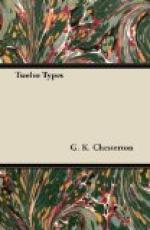This last and worst of human miseries Savonarola saw afar off, and bent his whole gigantic energies to turning the chariot into another course. Few men understood his object; some called him a madman, some a charlatan, some an enemy of human joy. They would not even have understood if he had told them, if he had said that he was saving them from a calamity of contentment which should be the end of joys and sorrows alike. But there are those to-day who feel the same silent danger, and who bend themselves to the same silent resistance. They also are supposed to be contending for some trivial political scruple.
Mr M’Hardy says, in defending Savonarola, that the number of fine works of art destroyed in the Burning of the Vanities has been much exaggerated. I confess that I hope the pile contained stacks of incomparable masterpieces if the sacrifice made that one real moment more real. Of one thing I am sure, that Savonarola’s friend Michael Angelo would have piled all his own statues one on top of the other, and burnt them to ashes, if only he had been certain that the glow transfiguring the sky was the dawn of a younger and wiser world.
THE POSITION OF SIR WALTER SCOTT
Walter Scott is a writer who should just now be re-emerging into his own high place in letters, for unquestionably the recent, though now dwindling, schools of severely technical and aesthetic criticism have been unfavourable to him. He was a chaotic and unequal writer, and if there is one thing in which artists have improved since his time, it is in consistency and equality. It would perhaps be unkind to inquire whether the level of the modern man of letters, as compared with Scott, is due to the absence of valleys or the absence of mountains. But in any case, we have learnt in our day to arrange our literary effects carefully, and the only point in which we fall short of Scott is in the incidental misfortune that we have nothing particular to arrange.




